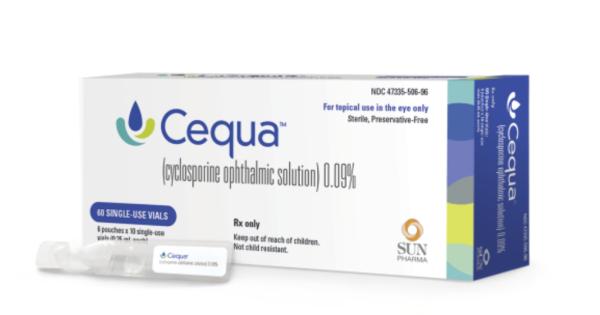Generic Cequa Availability
Last updated on Apr 10, 2025.
Cequa is a brand name of cyclosporine ophthalmic, approved by the FDA in the following formulation(s):
CEQUA (cyclosporine - solution;ophthalmic)
-
Manufacturer: SUN PHARM
Approval date: August 14, 2018
Strength(s): 0.09% [RLD]
Is there a generic version of Cequa available?
No. There is currently no therapeutically equivalent version of Cequa available in the United States.
Note: Fraudulent online pharmacies may attempt to sell an illegal generic version of Cequa. These medications may be counterfeit and potentially unsafe. If you purchase medications online, be sure you are buying from a reputable and valid online pharmacy. Ask your health care provider for advice if you are unsure about the online purchase of any medication.
See also: Generic Drug FAQ.
Related patents
Patents are granted by the U.S. Patent and Trademark Office at any time during a drug's development and may include a wide range of claims.
-
Topical formulations and uses thereof
Patent 10,441,630
Issued: October 15, 2019
Inventor(s): Mitra Ashim K. & Weiss Sidney L. & McNally Eugene J.
Assignee(s): SUN PHARMA GLOBAL FZEProvided herein include formulations for topical administration, such as ophthalmic formulations, and methods of using such formulations. In some aspects and embodiments the formulations may include a polyoxyl lipid or fatty acid, and or a polyalkoxylated alcohol and may include nanomicelles. Also include methods of treating or preventing diseases or conditions, such as ocular diseases or conditions.
Patent expiration dates:
- August 23, 2033✓
- August 23, 2033
-
Topical cyclosporine-containing formulations and uses thereof
Patent 10,918,694
Issued: February 16, 2021
Inventor(s): Weiss; Sidney L. et al.
Assignee(s): SUN PHARMA GLOBAL FZE (Sharjah, AE)Provided herein are formulations for topical ophthalmic formulations containing 0.087-0.093 wt % of cyclosporine, and methods of making and using such formulations. In some aspects and embodiments the formulations may include a polyoxyl lipid or fatty acid, and/or a polyalkoxylated alcohol and may include nanomicelles. Also included herein are methods of treating or preventing diseases or conditions, such as ocular diseases or conditions.
Patent expiration dates:
- February 28, 2037✓
- February 28, 2037
-
Topical cyclosporine-containing formulations and uses thereof
Patent 11,951,153
Issued: April 9, 2024
Inventor(s): Weiss; Sidney L. et al.
Assignee(s): SUN PHARMACEUTICAL INDUSTRIES LIMITED (Maharashtra, IN)Provided herein are formulations for topical ophthalmic formulations containing 0.087-0.093 wt % of cyclosporine, and methods of making and using such formulations. In some aspects and embodiments the formulations may include a polyoxyl lipid or fatty acid, and/or a polyalkoxylated alcohol and may include nanomicelles. Also included herein are methods of treating or preventing diseases or conditions, such as ocular diseases or conditions.
Patent expiration dates:
- February 28, 2037✓
- February 28, 2037
-
Topical aqueous nanomicellar, ophthalmic solutions and uses thereof
Patent 8,980,839
Issued: March 17, 2015
Inventor(s): Mitra Ashim K. & Weiss Sidney L.
Assignee(s): Ocular Technologies SARLProvided herein include formulations for topical administration, such as ophthalmic formulations, and methods of using such formulations. In some aspects and embodiments the formulations may include a polyoxyl lipid or fatty acid, and or a polyalkoxylated alcohol and may include nanomicelles. Also include methods of treating or preventing diseases or conditions, such as ocular diseases or conditions.
Patent expiration dates:
- August 23, 2033✓✓
- August 23, 2033
-
Topical formulations and uses thereof
Patent 9,937,225
Issued: April 10, 2018
Inventor(s): Mitra Ashim K. & Weiss Sidney L.
Assignee(s): SUN PHARMA GLOBAL FZEProvided herein include formulations for topical administration, such as ophthalmic formulations, and methods of using such formulations. In some aspects and embodiments the formulations may include a polyoxyl lipid or fatty acid, and or a polyalkoxylated alcohol and may include nanomicelles. Also include methods of treating or preventing diseases or conditions, such as ocular diseases or conditions.
Patent expiration dates:
- August 23, 2033✓✓
- August 23, 2033
More about Cequa (cyclosporine ophthalmic)
- Check interactions
- Compare alternatives
- Pricing & coupons
- Reviews (39)
- Drug images
- Side effects
- Dosage information
- During pregnancy
- FDA approval history
- Drug class: miscellaneous ophthalmic agents
- Breastfeeding
- En español
Patient resources
Other brands
Professional resources
Other brands
Related treatment guides
Glossary
| Term | Definition |
|---|---|
| Drug Patent | A drug patent is assigned by the U.S. Patent and Trademark Office and assigns exclusive legal right to the patent holder to protect the proprietary chemical formulation. The patent assigns exclusive legal right to the inventor or patent holder, and may include entities such as the drug brand name, trademark, product dosage form, ingredient formulation, or manufacturing process A patent usually expires 20 years from the date of filing, but can be variable based on many factors, including development of new formulations of the original chemical, and patent infringement litigation. |
| Drug Exclusivity | Exclusivity is the sole marketing rights granted by the FDA to a manufacturer upon the approval of a drug and may run simultaneously with a patent. Exclusivity periods can run from 180 days to seven years depending upon the circumstance of the exclusivity grant. |
| RLD | A Reference Listed Drug (RLD) is an approved drug product to which new generic versions are compared to show that they are bioequivalent. A drug company seeking approval to market a generic equivalent must refer to the Reference Listed Drug in its Abbreviated New Drug Application (ANDA). By designating a single reference listed drug as the standard to which all generic versions must be shown to be bioequivalent, FDA hopes to avoid possible significant variations among generic drugs and their brand name counterpart. |
Further information
Always consult your healthcare provider to ensure the information displayed on this page applies to your personal circumstances.

